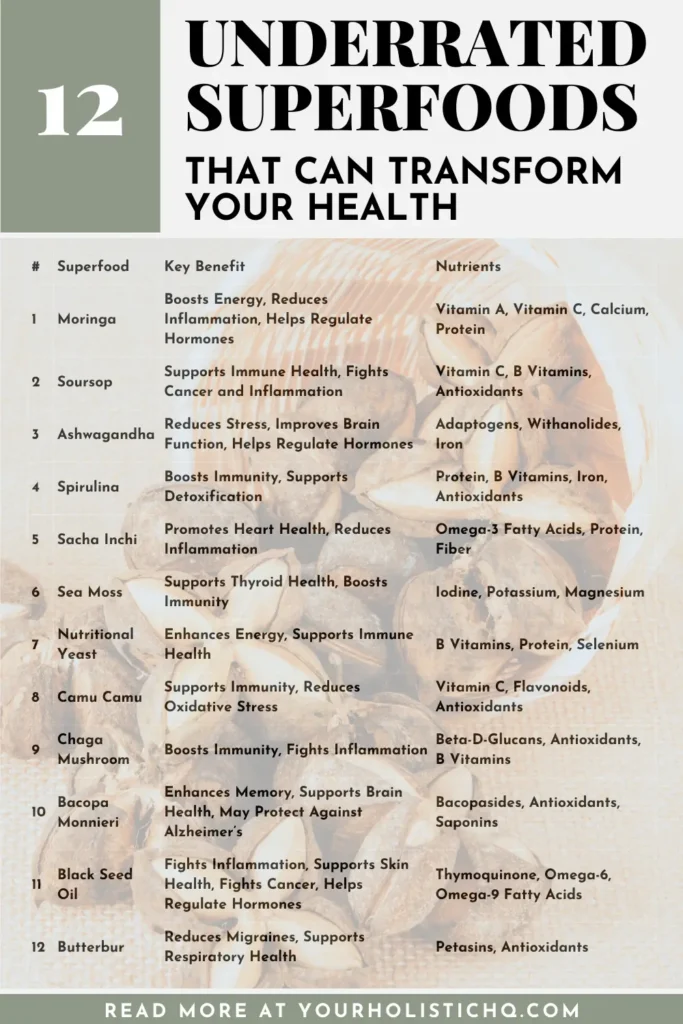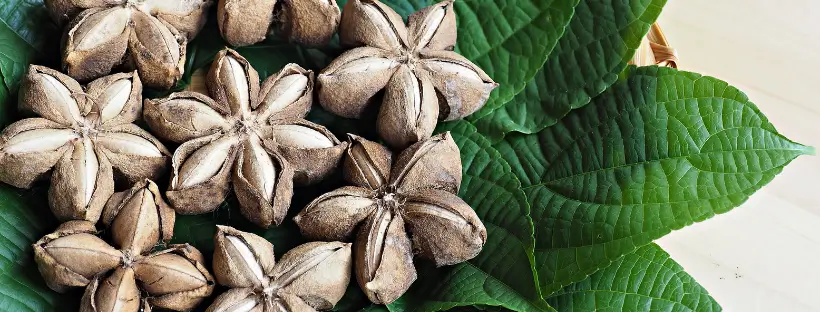12 Underrated Superfoods That Can Transform Your Health

You’ve likely heard of common superfoods, but there are many more that carry equally powerful health benefits. These foods have been used for centuries across various cultures, known for their ability to boost energy, support immunity, and reduce inflammation. Despite not being as widely recognized, their nutritional value is undeniable. By incorporating these ingredients into your diet, you can experience a range of benefits that support overall well-being. Let’s explore these remarkable foods and how they can make a lasting difference in your health.
Disclosure: The information provided is for educational purposes only and not intended as medical advice. Consult a healthcare professional before making any changes to your health routine. If you make a purchase through the links provided, I may earn a small commission at no additional cost to you.


1. Moringa

Moringa, often called the “miracle tree,” is a nutrient-packed plant native to India, Africa, and Asia. Its leaves, seeds, and pods have been consumed for centuries in traditional medicine to treat various ailments. Rich in vitamins A, C, and E, as well as calcium, potassium, and iron, moringa offers a significant boost to immune health, skin vitality, and bone strength. Its high antioxidant content helps protect the body from oxidative stress and inflammation.
Studies show that moringa has potential benefits for controlling blood sugar levels and reducing blood pressure, making it supportive of heart health. A 2012 study in Phytotherapy Research found that moringa leaf powder helped reduce blood sugar levels in diabetic patients. The plant is also a complete source of protein, containing all nine essential amino acids, which makes it especially valuable for those on plant-based diets.
Moringa is available in various forms—powder, fresh leaves, or capsules—and can easily be added to smoothies or meals. While generally considered safe, it’s always advisable to consult a healthcare professional before making it a regular part of your diet, especially if you have existing medical conditions or are taking medications. Its growing popularity highlights its potential as a powerful superfood for overall well-being.
2. Soursop

Soursop, also known as Graviola, is a tropical fruit native to the Caribbean and South America, where it has been consumed for centuries due to its abundance. Rich in vitamins C, B1, and B2, soursop supports immune health, boosts energy, and aids digestion with its high fiber content. Its antioxidants also protect the body from oxidative stress and inflammation, making it a valuable addition to any diet.
Studies have explored soursop’s potential in fighting cancer. A 1997 study in The Journal of Natural Products found acetogenins selectively kill cancer cells without harming healthy ones, and a 2011 study in Cancer Letters showed soursop inhibits pancreatic cancer growth. A 2015 review noted positive results but called for more human trials. A 2018 review further suggested that soursop could act as a chemopreventive agent, potentially preventing cancer from developing.
However, a 2002 study in Movement Disorders raised concerns about the neurotoxin annonacin, found in the seeds, bark, and leaves—parts of the plant not typically eaten. Despite these concerns, other research and traditional practices, such as a study from 2011 in Cancer Research Journal, indicate that soursop leaves contain healing compounds that may offer therapeutic benefits, particularly when used in tea.
Despite these promising findings, soursop is rarely highlighted in mainstream health discussions. Sickness has become a business, and natural remedies like soursop, which can’t be patented or commercialized like pharmaceuticals, are often overlooked.
3. Ashwagandha

Ashwagandha, also known as Withania somnifera, has been a cornerstone of Ayurvedic medicine for over 3,000 years. This adaptogenic herb is renowned for its ability to help the body manage stress, balance hormones, and improve overall vitality. Rich in withanolides, its roots and leaves are packed with bioactive compounds that have been shown to support both physical and mental well-being, making it a go-to remedy for a wide range of health concerns.
One of the most researched benefits of ashwagandha is its ability to lower cortisol levels, the hormone responsible for stress. A 2012 study found that individuals who took ashwagandha experienced a significant reduction in cortisol, which can help relieve chronic stress and anxiety. Beyond stress reduction, the herb’s adaptogenic properties also boost energy levels and reduce fatigue, making it effective for those dealing with high-pressure environments or burnout.
Ashwagandha also supports brain function and cognitive health. A 2017 study found that it improved memory, attention, and information processing speed in participants. Its neuroprotective properties may also help guard against age-related cognitive decline. In many cases, these conditions are treated with synthetic drugs that tend to focus on symptom management rather than addressing the underlying issues. Ashwagandha, however, offers a more holistic approach, promoting long-term balance and overall well-being.
4. Spirulina

Spirulina is a blue-green algae that is considered one of the most nutrient-dense superfoods available. It has been consumed for centuries, dating back to the Aztecs, who valued its immense nutritional content. Spirulina contains all nine essential amino acids, making it a complete protein source, which is rare for plant-based foods. This makes it especially beneficial for individuals following vegetarian or vegan diets, as well as anyone seeking a natural, potent source of protein.
In addition to its high protein content, spirulina is rich in antioxidants, particularly phycocyanin, which is responsible for its blue-green color. These antioxidants help fight oxidative stress, reduce inflammation, and protect cells from damage. Some research suggests that spirulina may also support immune health and lower cholesterol and blood pressure, which contributes to improved heart health. Studies have shown that spirulina’s antioxidant and anti-inflammatory properties can play a role in reducing the risk of chronic diseases.
Spirulina has also been studied for its detoxifying effects, particularly in removing heavy metals from the body. Research in 2016 found that spirulina, when combined with zinc, helped to eliminate arsenic from the body. However, its comprehensive range of nutrients and its ability to support detoxification make it a valuable addition to a healthy diet.
5. Sacha Inchi

Sacha Inchi, also known as the “Inca peanut,” is a plant native to the Amazon rainforest and has been used for centuries by indigenous populations for its nutritional benefits. The plant produces small star-shaped pods containing seeds that are rich in healthy fats, proteins, and essential nutrients. Although referred to as a peanut, it is not a legume but a seed that provides a range of nutrition, making it highly valued in modern health and wellness.
Sacha Inchi is particularly known for its high content of omega-3 fatty acids, which are important for heart health, brain function, and reducing inflammation. These seeds are one of the richest plant-based sources of omega-3s. Additionally, they are packed with protein, making them a useful option for those following plant-based diets. Sacha Inchi seeds contain all nine essential amino acids, making them a complete protein source that is also easily digestible.
Sacha Inchi is also rich in antioxidants, such as vitamin E, which helps protect the body from oxidative stress and supports skin health. Its anti-inflammatory properties contribute to cardiovascular health, reducing cholesterol levels, and supporting overall wellness. Whether consumed as roasted seeds, oil, or supplements, Sacha Inchi offers a versatile and nutritious addition to any diet.
6. Sea Moss

Sea Moss, also called Irish Moss or Chondrus crispus, is a type of red algae found along the coasts of Europe, North America, and the Caribbean. It has been used for centuries in traditional medicine due to its numerous health benefits. Sea moss is packed with essential vitamins and minerals, including iodine, calcium, potassium, and magnesium, making it a nutritious addition to any diet.
One of its key benefits is its iodine content, which is vital for supporting healthy thyroid function. The thyroid plays a crucial role in regulating metabolism, energy levels, and other bodily functions. Sea moss also promotes immune health and aids digestion, as its fiber content helps maintain gut health and soothes the digestive tract.
Sea moss is known for its antioxidant and anti-inflammatory properties and has traditionally been used to support respiratory health by soothing mucus membranes and relieving congestion. It can be consumed in various forms, such as raw, powdered, or as a gel, often added to smoothies or soups to increase nutrient intake. While sea moss has gained popularity recently, it has been trusted for generations as a natural remedy to support overall health and wellness.
7. Nutritional Yeast

Nutritional yeast is a deactivated form of yeast, specifically Saccharomyces cerevisiae, often used as a nutrient-rich food supplement. Known for its savory, cheese-like flavor, it is popular in vegan and vegetarian diets. Nutritional yeast is usually sold in the form of yellow flakes or powder and is added to various dishes to enhance flavor while providing essential nutrients.
One of the main benefits of nutritional yeast is its high content of B vitamins, particularly vitamin B12, which is crucial for energy production and maintaining healthy nerve function. For people following plant-based diets, it serves as an excellent source of vitamin B12. Nutritional yeast is also rich in protein and provides all nine essential amino acids, making it a useful addition for anyone looking to boost their protein intake without relying on animal products.
Additionally, nutritional yeast contains antioxidants, which help protect cells from damage and support overall health. It is also associated with promoting immune health due to its content of beta-glucan, a fiber known for its immune-boosting effects. Nutritional yeast can be added to popcorn, sauces, or used as a seasoning to increase the nutritional value and enhance the flavor of meals.
8. Camu Camu

Camu Camu is a small, sour fruit that grows in the Amazon rainforest, primarily in Peru and Brazil. It is widely recognized for its exceptionally high content of vitamin C, which is one of the highest of any known fruit. Just a small amount of camu camu powder can provide several times the recommended daily intake of vitamin C, making it a powerful immune booster and a key player in supporting overall health. Traditionally, it has been used by indigenous populations for its medicinal properties.
The fruit also contains a variety of antioxidants, such as flavonoids and carotenoids, which help combat oxidative stress and reduce inflammation in the body. These antioxidants are thought to protect cells from damage, support skin health, and contribute to a healthy aging process. Beyond its antioxidant profile, camu camu is known to help reduce inflammation and may support heart health by potentially lowering blood pressure.
Camu camu is most commonly consumed in powdered form, as the fresh fruit is extremely tart and difficult to find outside of the Amazon. It can be added to smoothies, juices, or even sprinkled over oatmeal to enhance both flavor and nutrition. While it has gained popularity in the wellness community due to its high vitamin C content, camu camu also provides other health benefits, making it a versatile and nutrient-packed superfood.
9. Chaga Mushroom

Chaga mushroom (Inonotus obliquus) is a type of fungus that primarily grows on birch trees in cold climates, including parts of Siberia, Canada, and Northern Europe. This mushroom has been used for centuries in traditional medicine, particularly in Russia and Eastern Europe, for its wide range of health benefits. Rich in bioactive compounds like polysaccharides and triterpenoids, chaga is praised for its antioxidant properties and its ability to support overall wellness.
One of the key benefits of chaga mushroom is its high antioxidant content, particularly its levels of superoxide dismutase (SOD), a powerful enzyme that helps neutralize free radicals in the body. This makes chaga an effective agent in fighting oxidative stress and reducing inflammation. Some research suggests that these antioxidants may help protect cells from damage and could even play a role in cancer prevention. In addition to its antioxidant activity, chaga has been linked to supporting immune function, potentially enhancing the body’s ability to fight off infections and illnesses.
Chaga is often consumed as a tea, tincture, or in powdered form and is known for its earthy, slightly bitter flavor. It is also believed to promote digestive health and may help regulate blood sugar levels, making it a versatile addition to a health-conscious diet. Although more research is needed to fully understand its potential, chaga mushroom continues to gain popularity as a natural remedy, providing a wide range of benefits to support long-term health.
10. Bacopa Monnieri

Bacopa monnieri, also known as Brahmi, is a perennial herb traditionally used in Ayurvedic medicine for its cognitive-enhancing and medicinal properties. Native to wetlands and tropical regions, Bacopa has long been valued for its ability to support memory, focus, and mental clarity. It has been used for centuries to treat conditions such as anxiety, epilepsy, and cognitive decline.
Scientific studies have shown that Bacopa can improve memory retention, cognitive processing, and overall brain function. A 2016 study demonstrated that participants who took Bacopa supplements showed significant improvements in memory recall and cognitive performance compared to a placebo group. These cognitive benefits are thought to come from the herb’s active compounds, called bacosides, which help repair damaged neurons and improve communication between brain cells.
In addition to cognitive benefits, Bacopa monnieri is known for its anti-anxiety and stress-reducing effects. As an adaptogen, Bacopa helps the body manage stress by regulating cortisol levels and supporting a balanced mood. It is traditionally consumed as a tea or in supplement form and continues to be widely used as a natural remedy for both cognitive health and mental well-being.
11. Black Seed Oil

Black seed oil, derived from the seeds of Nigella sativa, has been used for centuries in traditional medicine across the Middle East, Africa, and Asia. It is known for its wide range of health benefits and has earned the nickname “the seed of blessing.” The oil contains thymoquinone, an active compound with antioxidant, anti-inflammatory, and antimicrobial properties, making it a valuable remedy for overall health.
Black seed oil has been studied for its ability to improve immune function. Its antioxidant and anti-inflammatory effects may help protect the body from chronic diseases and reduce oxidative stress. Additionally, black seed oil has shown potential in supporting heart health by helping to reduce high blood pressure and cholesterol levels, which are important for cardiovascular health. There is also emerging research that suggests thymoquinone may have anti-cancer properties, with studies showing its ability to inhibit cancer cell growth and promote cancer cell death, though more human trials are needed to confirm these findings.
The oil is also known for its benefits in promoting skin health and managing conditions like acne, eczema, and psoriasis. Its antimicrobial properties help protect the skin from infections, while its anti-inflammatory effects can soothe irritation and support healing. Black seed oil can be consumed as a supplement or applied topically, making it a versatile remedy with numerous health benefits.
12. Butterbur

Butterbur (Petasites hybridus) is a perennial herb native to Europe and parts of Asia and North America. It has been used in traditional medicine for centuries to treat fevers, wounds, and respiratory issues. Today, butterbur is most commonly known for its use in relieving migraines and managing seasonal allergies.
Research has shown that butterbur can be effective in treating migraines. Compounds in the plant, such as petasin and isopetasin, help reduce inflammation and relax blood vessels, which can help prevent or reduce the frequency of migraines. Some studies have reported significant reductions in migraine attacks with regular use of butterbur extract.
Butterbur is also used to alleviate symptoms of seasonal allergies like hay fever. Its anti-inflammatory properties make it a natural option for reducing allergy symptoms. However, butterbur contains pyrrolizidine alkaloids (PAs) that can be toxic to the liver if not processed correctly. Therefore, only PA-free butterbur supplements should be used to avoid potential risks.
Final Thoughts

Incorporating lesser-known superfoods into your diet can provide powerful health benefits that go beyond the usual trends. These 12 underrated ingredients offer a wide range of support, from boosting energy and enhancing brain function to reducing inflammation and strengthening the immune system. While they may not always be in the spotlight, their nutritional value is undeniable and time-tested across various cultures.
By embracing these nutrient-dense foods, you take a holistic approach to your well-being, addressing root causes rather than merely managing symptoms. Whether you add them to smoothies, teas, or daily meals, these superfoods have the potential to transform your health in ways you may not have expected.
As always, it’s important to follow your doctor’s advice for any health issues. However, adding these natural remedies to your routine could be a valuable way to support your overall well-being. True wellness comes from balance, and these superfoods are a powerful tool to help you along the way.





